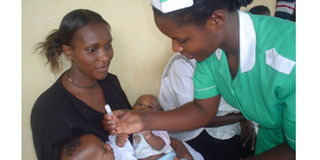Government has only 3,000 TB vaccines

A nurse administers a vaccine to children in Kampala recently.
What you need to know:
The shortage has been attributed to production delays at the manufacturers.
Kampala
Children in Uganda are likely to miss the Bacillus Calmette-Guérin (BCG) vaccine which protects them against TB – at least until the production issues at the global level are sorted.
According to the Uganda National Expanded Programme for Immunisation (UNEPI) manager, Dr Robert Mayanja, the country has been experiencing a shortage since the beginning of 2014.
But the shortage is expected to escalate in the coming months after receiving only 300,000 out of 1.8 million doses of the vaccine they had ordered for the last quarter of 2014.
The vaccine should have lasted the country at least until end of December going by projections of 100,000 babies born per month. But according to Dan Kimosho, the spokesperson for the National Medical Stores (NMS), only 3,000 doses are left in the stores.
This means that in a week or two, the country will be totally out of stock for this critical vaccine that is given to babies at birth for the prevention against Tuberculosis.
Some facilities in Kampala have run out of stocks. a nurse at Mulago hospital immunisation clinic who declined to be named said they have not had the vaccine for some weeks.
At Kiswa Health Centre mothers also reported that their children had missed the vaccine and that the health workers told them it was out of stock. “I brought my baby to be vaccinated but we have been told that the vaccine is not there,” said Ms Madina Nalukwago.
Information on the website of Sanofi Pasteur, the largest pharmaceutical company devoted to vaccines, attributes the shortage to manufacturing delays. Another company – Merck Pharmaceutical Company states the reason for the shortage is manufacturing delay and that they were having insufficient supply for usual ordering.
Sanofi Pasteur also said they project that they could release the vaccine in second quarter of 2015 while Merck estimates a release in October 2014. However, Merck also states that they will release product as it becomes available and according to when orders were placed.
Who requirements to blame
Dr Andrew Bakainaga, the World Health Organisation Country Coordinator for Vaccines and Immunisations, confirmed a global shortfall saying the suppliers are working on improving some production standards in conformity with the WHO requirements.




